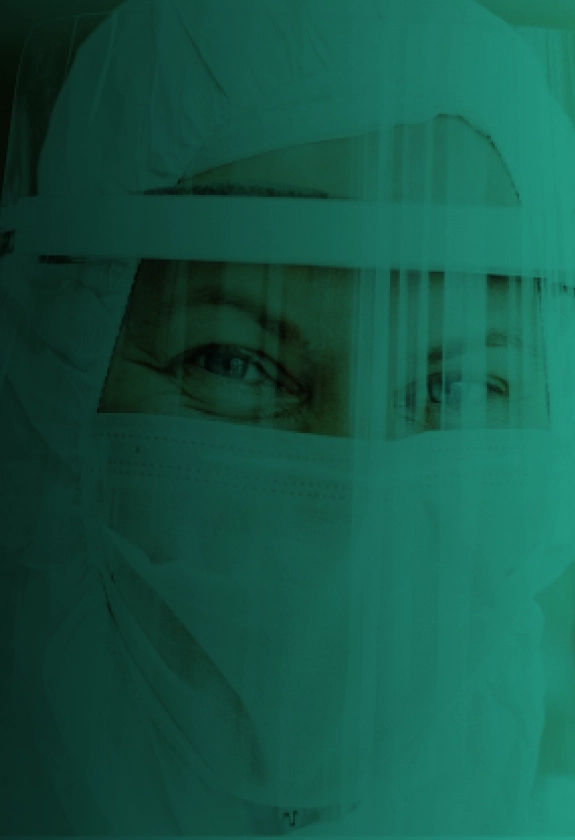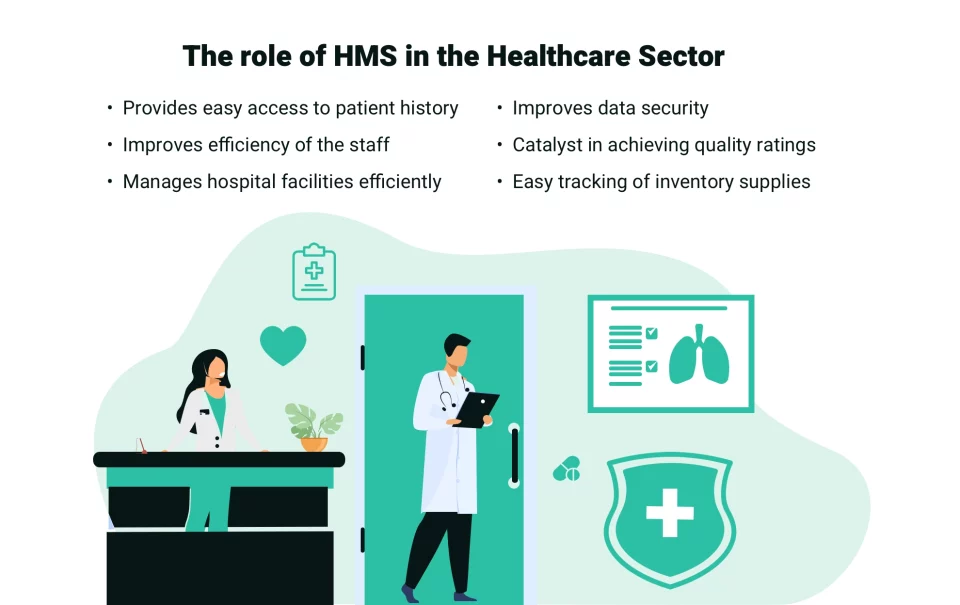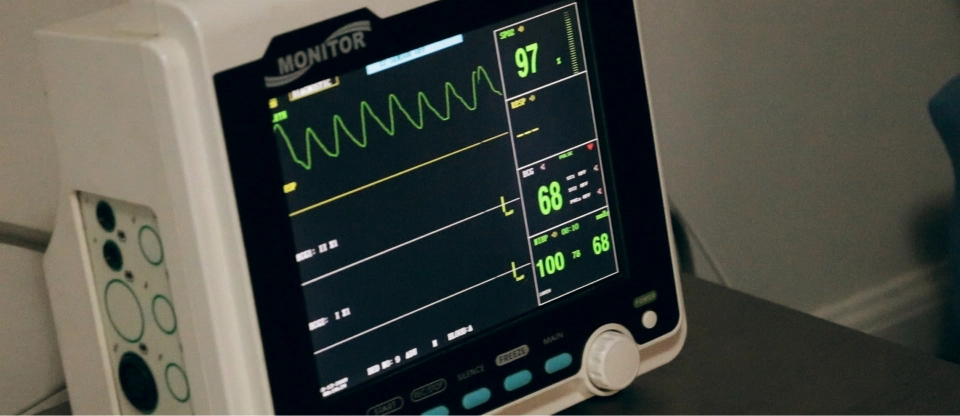INTRODUCTION
An introduction to hospital management software
Hospital management software (HMS) handles all the different aspects of managing services at a hospital using mobile applications, web portals, and other types of digital products. A modern HMS solution has features to enhance clinical medical services, administration, operations, finance, and all the other workflows, business units, and departments across a healthcare facility. It improves efficiency, accuracy, and overall patient care by:
- Automating administrative and operational tasks.
- Streamlining workflows and processes
The terms hospital management software, hospital information system software, and health management information system are used interchangeably. However, there may be subtle differences in how organizations build their solutions based on IT capabilities.
When we talk about a hospital solution or software, the information system may be restricted to the administration of the healthcare facility—including workflows, processes, finance, staff management, supply chain, and support services. When we refer to a health or healthcare management system, an entire range of specialized solutions that facilitate patient engagement and patient-centric care come into the picture.
With disruptive technologies coming in, custom software development is being optimized, and most information systems try to incorporate different elements. So, really, the lines between hospital and healthcare information ecosystems have blurred.
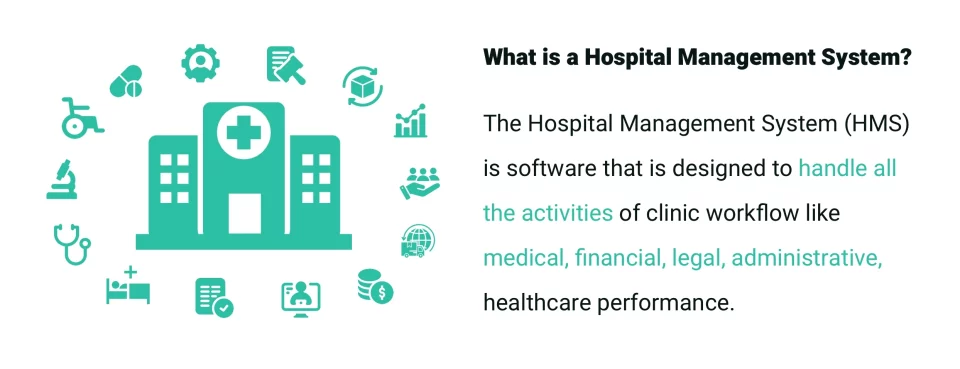 Hospital management software is also called hospital or healthcare information system software
Hospital management software is also called hospital or healthcare information system software
Delivering a "quality culture of continuous improvement" with custom hospital management solutions is crucial. Here are some key features and benefits of next-generation hospital practice management solutions.
FEATURES
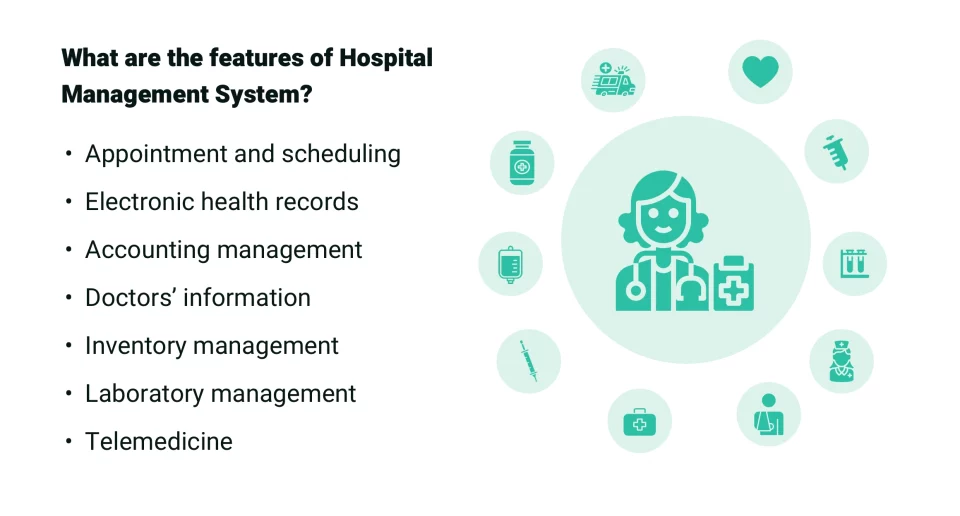
The features of hospital management systems are expanding and improving patient care
Know more about hospital management software features
Every practice environment is unique, and every organization has its own way of delivering patient care services. Here are some of the most popular features of hospital information system software solutions.
EHR/EMR: Securely stores and manages all digital health records of patients, including medical health history, test results, diagnosis, and treatment.
Inpatient registration and boarding: A feature that records patient demographics and manages admissions, discharge, and transfers.
Outpatient payment processing services: Tools to securely process payments with visiting customers after they have received medical services.
Telemedicine consultation management tools: Facilitates services that allow patients to communicate with their doctors using digital communications.
Billing and invoicing: A solution that generates bills for consultations, procedures, hospital stays, and services.
Scheduling and reporting: It manages appointment slots and availability updates for physicians while providing appointments and reminders to patients.
Digital imaging solutions: Resources to securely transmit digital images such as diagnostic images from CT scans, mammograms, and MRIs of the radiology department.
Diagnostic lab services: Called laboratory information management, it manages sample tracking and workflow, automates test orders, records results, and transmits findings to clinicians.
Vital tracking and remote patient monitoring tools: Solutions that allow providers to monitor their patient’s health in real-time.
Patient portals: A patient engagement tool that helps them manage their care, schedule appointments, access learning resources, and personal health information.
Workforce engagement and training tools: Resources for hospitals to train, reskill, and upskill their teams with life-long learning material.
Claims management solutions: Applications that support end-to-end claims workflow and collaboration for life insurance products.
E-prescription tools: Solutions to manage pharmacy operations and prescribe medications.
Inventory management: It helps track the supply of drugs, equipment, and medical supplies, monitor stocks, set reorder points, and send alerts on drug expiration.
Security and access control: It helps to provide role-based access control to protect patient data and also comply with regulatory compliance in healthcare software development.
Integration with external systems: It is capable of integrating seamlessly with insurance providers, pharmacies, electronic health exchanges, and labs.
Financial management: It helps to manage budget allocations for hospital departments and payroll of staff, while tracking expenses and revenue generated.
Analytics and reporting: It generates insights through advanced data analytics, monitors performance indicators of operations, and supports decision-making.
Pharmacy management: A tool that can handle prescription management, including pricing, drug use and interactions information, and dispensing.
HMS has improved data security and healthcare service delivery
DRAWBACKS
HMS implementation has its share of challenges
When you launch a big-ticket hospital information software development project, it is quite natural to face some difficulties. It is better to be aware of these challenges and prepare to overcome them.
Commencement costs and implementation challenges: Implementing a hospital management system entails substantial initial expenditures for hardware procurement, software acquisition, training initiatives, and infrastructure upgrades. In addition, harmonizing existing workflows with new ones calls for meticulous planning and agile change management.
Safeguarding data security and privacy: Hospital management systems are a repository of sensitive patient data and need solid data security and privacy. The robust security measures and stringent policies needed to safeguard against patient data breaches and unauthorized access require heavy resource allocation.
Confronting technical hurdles and downtime: Some healthcare organizations worry about technical glitches, system downtime, or compatibility hiccups. While such events do have the potential to disrupt the availability and reliability of the hospital management system, a robust backup and disaster recovery protocol can mitigate the situation. A contingency plan should be in place to prevent interruptions to patient care and workflow continuity.
Cultivating user adoption and proficiency: Integrating a new health management system should be backed by concerted efforts to encourage user adoption. Adequate training and reskilling healthcare professionals to counter resistance to change will help to make the transition to digital hospital information management software.
BENEFITS
Benefits of hospital management software
Digital transformation in hospitals is fueling innovation in hospitals around the world. Here are some of the most essential benefits of hospital management software for healthcare enterprises:
Deliver a Quality Culture of Continuous Improvement
A modern HMS system is at the forefront of efforts to identify areas of improvement, measure the success of interventions, and deliver the insights needed to truly innovate and optimize performance.
Building a culture of continuous improvement is more effective. Healthcare organizations have access to more robust data sets describing the results of their work and efforts to deliver the best possible medical services.
Harness the Full Potential of Automation
Many healthcare organizations still rely on cumbersome manual processes that are prone to errors and lead to staff burnout. There has to be a better way.
Automation transforms healthcare operations by allowing teams to streamline tasks using purpose-built digital products, mobile applications, and web application platforms. Hospital management solutions allow your organization to gather data and optimize performance with patients and business interaction at every touchpoint. Deliver a more innovative and resilient healthcare business by leveraging the full potential of healthcare AI automation.
Deliver Measurable Cost Savings
Digitalization, automation, and implementing data-driven decision-making are just a few technology-driven capabilities that empower healthcare organizations like yours t0 reduce costs at scale. There are more intelligent and efficient ways of handling every medical and business interaction your organization engages with.
The right hospital management software tools provide your executive decision-makers with the business intelligence needed to unlock new business opportunities and profitability while trimming fat and reducing wastage at every step in your value chain.
Build More Engaging Digital Experiences for Patients and Providers
Your organization’s digital services are an extension of your reputation and organizational culture.
Extending the digital front door to patients means building digital journeys that invigorate their care, providing the necessary access and answers.
Hospital management systems are vital in delivering the hybrid remote task management that your physicians seek. Digital products for hospitals benefit all the different stakeholders and end-users connected to them.
Providing anytime, anywhere care with mobile accessibility
Access to point-of-care tools, such as mobile apps and responsive web interfaces that can be accessed on smartphones and tablets, have proved to support better clinical decision-making and improved patient outcomes.
Mobile accessibility is useful for information and time management, health record maintenance and access, communications and consulting, reference and information gathering, patient management and monitoring, clinical decision-making, and medical education and training.
CONCLUSION
Assess the pros and cons of your HMS project
In conclusion, it is wise to weigh the advantages and disadvantages of hospital management systems before embarking on developing customized solutions that satisfy your unique needs. This empowers hospitals to make well-informed decisions. On instituting the requisite safeguards, it is possible to harness the complete capabilities of a hospital management system to augment patient care and operational efficiency.
